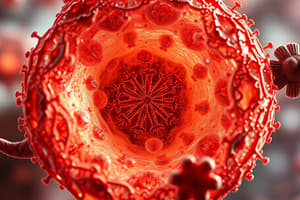Podcast
Questions and Answers
What is the primary role of tumour suppressor genes in relation to the cell cycle?
What is the primary role of tumour suppressor genes in relation to the cell cycle?
- To negatively regulate the cell cycle (correct)
- To promote oncogene activity
- To enhance cell cycle progression
- To facilitate uncontrolled cell growth
How do mutations in tumour suppressor genes generally affect cellular functions?
How do mutations in tumour suppressor genes generally affect cellular functions?
- They enhance cell differentiation
- They inhibit cell-to-cell contact
- They cause unregulated cell proliferation (correct)
- They lead to increased cell apoptosis
Which of the following statements about mutations in tumour suppressor genes is TRUE?
Which of the following statements about mutations in tumour suppressor genes is TRUE?
- They can lead to increased apoptosis
- They are typically dominant mutations
- They are generally recessive mutations (correct)
- They result in a gain of function
Which function is NOT associated with tumour suppressor genes?
Which function is NOT associated with tumour suppressor genes?
What is a key mechanism of action for tumour suppressor genes in tumorigenesis?
What is a key mechanism of action for tumour suppressor genes in tumorigenesis?
Which therapy specifically targets estrogen receptors in breast cancer treatment?
Which therapy specifically targets estrogen receptors in breast cancer treatment?
What is the primary function of aromatase inhibitors in breast cancer treatment?
What is the primary function of aromatase inhibitors in breast cancer treatment?
Imatinib mesylate is primarily effective against which type of cancer?
Imatinib mesylate is primarily effective against which type of cancer?
What type of enzymes do targeted therapies like Imatinib mesylate inhibit?
What type of enzymes do targeted therapies like Imatinib mesylate inhibit?
Which of the following is NOT a type of aromatase inhibitor?
Which of the following is NOT a type of aromatase inhibitor?
Which drug is specifically approved to treat HER2-positive breast cancer?
Which drug is specifically approved to treat HER2-positive breast cancer?
What is the primary mechanism of action for Gefitinib (Iressa®)?
What is the primary mechanism of action for Gefitinib (Iressa®)?
Which type of cancer is Erlotinib (Tarceva®) used to treat?
Which type of cancer is Erlotinib (Tarceva®) used to treat?
What role does Cetuximab (Erbitux®) play in cancer treatment?
What role does Cetuximab (Erbitux®) play in cancer treatment?
Which of the following components is depicted as inhibiting the EGFR pathway in the diagram?
Which of the following components is depicted as inhibiting the EGFR pathway in the diagram?
What role do oncogenes primarily play in cell behavior?
What role do oncogenes primarily play in cell behavior?
Which statement is true regarding proto-oncogenes in normal cells?
Which statement is true regarding proto-oncogenes in normal cells?
What is a consequence of mutations in oncogenes in cancer cells?
What is a consequence of mutations in oncogenes in cancer cells?
How do mutations in oncogenes typically affect their function?
How do mutations in oncogenes typically affect their function?
Which of the following is NOT a feature of oncogenes?
Which of the following is NOT a feature of oncogenes?
Flashcards
Tumour suppressor genes
Tumour suppressor genes
Genes that normally help regulate the cell cycle and ensure cells die off when they should.
How do tumour suppressor gene mutations affect cell growth?
How do tumour suppressor gene mutations affect cell growth?
Mutations in these genes can lead to uncontrolled cell growth and potential cancer development.
Are tumour suppressor gene mutations dominant or recessive?
Are tumour suppressor gene mutations dominant or recessive?
Two copies of the gene need to be mutated to make these genes non-functional.
What are some functions of tumour suppressor genes?
What are some functions of tumour suppressor genes?
Signup and view all the flashcards
How do tumour suppressor genes interact with oncogenes?
How do tumour suppressor genes interact with oncogenes?
Signup and view all the flashcards
What is EGFR?
What is EGFR?
Signup and view all the flashcards
What are EGFR-tyrosine kinase inhibitors?
What are EGFR-tyrosine kinase inhibitors?
Signup and view all the flashcards
What are anti-EGFR antibodies?
What are anti-EGFR antibodies?
Signup and view all the flashcards
What is Trastuzumab (Herceptin)?
What is Trastuzumab (Herceptin)?
Signup and view all the flashcards
What are cancer growth blockers?
What are cancer growth blockers?
Signup and view all the flashcards
Oncogenes
Oncogenes
Signup and view all the flashcards
Proto-oncogenes
Proto-oncogenes
Signup and view all the flashcards
Oncogene activation
Oncogene activation
Signup and view all the flashcards
Dominant mutations
Dominant mutations
Signup and view all the flashcards
Gain-of-function mutations
Gain-of-function mutations
Signup and view all the flashcards
What are estrogen receptor blockers and how do they work?
What are estrogen receptor blockers and how do they work?
Signup and view all the flashcards
How do aromatase inhibitors work?
How do aromatase inhibitors work?
Signup and view all the flashcards
What is imatinib mesylate (Gleevec) and how does it work?
What is imatinib mesylate (Gleevec) and how does it work?
Signup and view all the flashcards
What are targeted therapies?
What are targeted therapies?
Signup and view all the flashcards
What are oncogenes?
What are oncogenes?
Signup and view all the flashcards
Study Notes
Tumour Suppressor Genes
- Encode proteins that negatively regulate the cell cycle and positively regulate apoptosis
- Mutations in tumour suppressor genes lead to loss of function and therefore increased cell proliferation
- Mutations in tumour suppressor genes are recessive
- Functions:
- affect differentiation
- control cell to cell contact
- growth inhibitory factors
- interact/ inhibit oncogenes
- regulate transcription
Studying That Suits You
Use AI to generate personalized quizzes and flashcards to suit your learning preferences.




